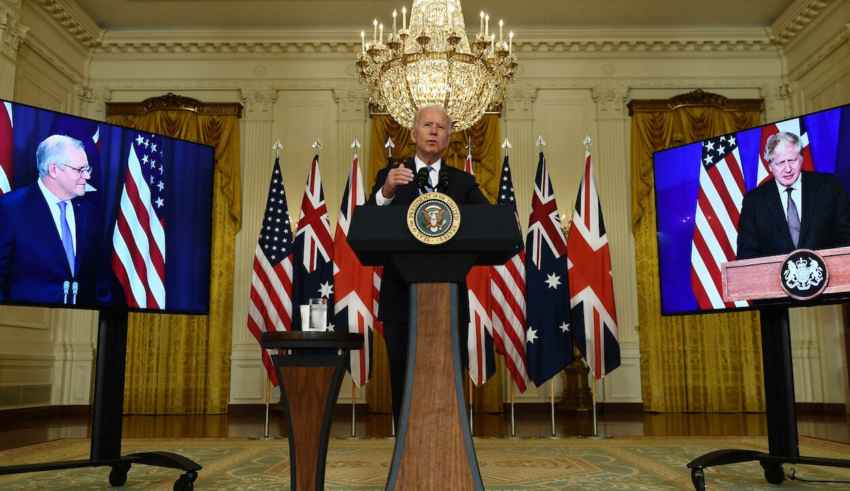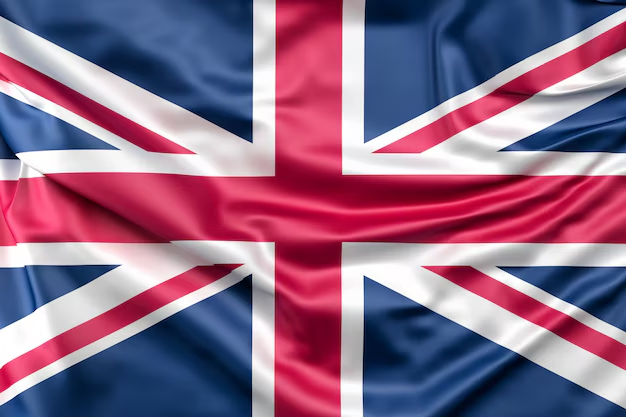
France lost a contract approximately worth $68 billion to provide twelve conventionally-powered submarines to Australia following the signing of a military pact between the US, the UK and Australia. After the announcement on September 15, quickly voices in mainstream media on both sides of the Atlantic Ocean raised their outrage and concerns over this – as many conceived it – abrupt development. US President Joe Biden was criticized for snubbing American allies and thereby undermining transatlantic relations. Justifying and defending the alliance, Biden as well as UK Prime Minister Boris Johnson stressed the strategic importance to “preserve security and stability around the world” (BBC, 2021).
Paris’s reaction of calling back its ambassador to the US – aside from openly undiplomatic language – shows how deeply hit the French government and establishment is. This is because this contract had mattered a great deal to the French armament industry putting parts of it at risk as well as reducing France’s capability to project its power into the Indo-Pacific (Muzergues, 2021). It also shows how little French elites understand US foreign policy and geopolitical developments overseas. And the bilateral deal signed with Canberra in 2016 had already run into problems before. In June of this year, Australia was looking for what they called a “plan B” as the construction of the submarines had allegedly run over budget and deadlines (Figaro, 2021). On top of that, the contract had become an internal political issue in Australia further complicating the fulfillment of the contractual obligations (Muzergues, 2021).
Now that tempers have somewhat cooled down, the strong reaction by French President Emmanuel Macron may have been targeted at a domestic audience as the incumbent has started his re-election campaign at next year’s national elections. Nevertheless, French elites seemed disappointed to have been passed over by the Americans and not to have been informed beforehand (Rising, 2021).
On the other side of the globe, Australia’s objective with building up a submarine fleet is to create a credible deterrent to hostile actions aimed against themselves (Figaro, 2021). In the context of the current geo-political developments surrounding the waters around Australia such a deterrent is aimed at China and its blue-water ambitions. Hence, the announcement of this new alliance was greeted by India and Japan, which make part of the so-called Quad alliance together with the US and Australia; smaller nations between Australia and Chin like Indonesia and Malaysia were less enthusiastic fearing a rise in tensions and the loss in action space to balance between the two sides (Petroni, 2021).
The contents of the Aukus pact
The pact signed by the US, the UK and Australia focuses on mutual aid to increase their military capability, which sets it also apart from the Fives Eyes intelligence-sharing alliance (furthermore including Canada and New Zealand). Even though the construction of eight nuclear-powered submarines by Australia itself with US technology help is the most prominent item, the pact also covers the sharing of cyber capabilities and diverse undersea technologies (BBC, 2021). The switch from building conventionally-powered to nuclear-powered submarines is not arbitrary: the latter type is faster, they can stay months under water, they are harder to detect, and they can carry more missiles with longer ranges (ibid.).
Other important aspects of the pact are an enhanced air cooperation provided through rotational deployment of US aircraft of all types in Australia including relevant aircraft training and exercises; an enhanced maritime cooperation consisting of expanding logistics and sustainment capabilities of US vessels in Australia; an enhanced on-land cooperation with joint military exercises and a more intensified joint engagement with allies and partners in the Indo-Pacific region; as well as the establishment of a combined logistics, sustainment, and maintenance enterprise to support modern warfare and combined military operations in the region (Prime Minister’s Office, 2021; White House, 2021).
The geo-economic and geopolitical meaning
Geo-economically, the Aukus pact, and the Australian submarine deal in particular, means not only a massive contract for the US defense industry and a huge loss to the French one – that now “hundreds of high-skilled jobs” (BBC, 2021) will be created in Australia and elsewhere is another reason why France reacted so angrily: it comes at the expense of the French workforce active in the field -; the deal will also strengthen American ties to its closest collaborators, and thereby, increase the US’s leverage over the latter’s defense decision-making.
On the geo-political level, this alliance will strengthen the US long-term strategy to contain China in the Indo-Pacific region using Australia as a proxy. Since Australia completes the (informal) Quad alliance (with the US, India and Japan), the other members will assumingly benefit the most from this deal. This occurs on top of the development that the Quad members have already increased joint military exercises and patrols in their waters and beyond. The Aukus pact joins a comprehensive list of similar defense agreements the US have signed with other non-European countries.
Until now, Australia’s most important defense agreement had been the 1952 ANZUS, a military alliance between the US, Australia and New Zealand, which guaranteed the joint defense in case of an armed attack on any party in the Pacific area. In 1986, ANZUS was suspended because of New Zealand’s anti-nuclear attitude and military cooperation continued separately between the US and Australia as well as the US and New Zealand. Australia entertains also military cooperation with Singapore and Malaysia under the Five Power Defense Arrangement from 1971 providing for annual joint exercises. Other significant partners in the region are Thailand, the Philippines, Brunei and Papua New Guinea and since 2007 also Japan. Canberra and Tokyo signed the Japan-Australia Joint Declaration on Security Cooperation, which marked the first defense agreement with another country than the US since WWII. In 2008, a security agreement (“Lombok Treaty” after the Strait) with Indonesia (Firth, 2013). Australia runs also the “Defence Cooperation Program” since the 1960s to support its strategic interests and its defense relationships with the aforementioned countries as well as Pakistan and the Middle East (Department of Defence, 2021). Altogether, the Aukus alliance will enhance Australia’s standing in the Indo-Pacific region as it will increase their defense capabilities on every level and improve their standing opposite Chinese threats.
China’s reaction and the Quad meeting in Washington, DC
Beijing did not wait long to show a reaction and underline why Australia would have been interested in the alliance after all. Last week, China sent 24 fighter jets toward Taiwan in a display of force to mark their claims over the island. Taiwan had announced its intention to join the Comprehensive and Progressive Agreement for Trans-Pacific Partnership, a free trade group containing several states in the region (Rising, 2021). China has also applied to become a member of this Partnership, however, it looks unrealistic since Australia is a member and every new applicant has to be voted in unanimously. It remains to be seen what Beijing’s next moves will be. Just a day before the Aukus announcement, Chinese vessels were spotted sailing near Alaska to showcase the latest blue-water capabilities of their navy (Xuanzun, 2021). Similar actions, especially in the South China Sea and the Strait of Taiwan can be expected together with warnings to states sending ships in these waters.
At the end of last week, Biden invited his peers from Japan, India and Australia to the Quadrilateral Security Dialogue in the US capital. Talks centered around strategies to keep the Indo-Pacific region “free and open” (Rising, 2021), as well as how to mitigate the Covid-19 pandemic and climate change. Another important topic discussed at the meeting was to build a global technology supply chain with democratic allies to undermine China’s position and growing influence in this strategically vital field. The three other states of the Quad stand closer to the US position than European countries, which prioritize their fears of harming their economic ties with China over long-term strategic considerations (Herszenhorn & Cerulus, 2021). As the Biden administration has pressed EU member states to align themselves closer to the US position, the upcoming months will see probably more American attempts at convincing single European governments to fall into line.
Conclusion
With the Ausuk defense alliance the US is following its course of re-arranging its strategic outlook in accordance with changes in the geopolitical environment in the last few years. This episode should be seen as a signal to European governments that they should reconsider and re-model their own defense strategies. It has revealed that the EU is only treated as an afterthought by US defense strategists. Earlier this year, members of the US administration had already adumbrated to European countries they should rather intensify their military presence in waters closer to their own borders instead of venturing out farther afield and spreading their already thin resources. This would only invite third parties (read Russia and Turkey) to take advantage and increase their own presence and leverage further over sea lanes and littoral states in the Mediterranean Sea.
Instead of dreaming of sending out its military units into the Indo-Pacific, Europe would be better off with a safer Mediterranean Sea and its adjacent seas. All premature calls of the end of NATO now sound as preposterous as they were in the first place. Biden already gave a heads up to provide aid to the struggling French military in the Sahel. Macron’s over-reaction may have more to do with the fact that his bid for re-election at next year’s presidential elections may be more contentious than four years ago. It was probably intentional that the announcement of the Aukus alliance coincided with the EU’s own declaration of its strategic commitment in the Indo-Pacific beyond economic and trade relations (Gaiani, 2021). Seen under this light the US clearly considers itself together with its two Anglo-Saxon allies as the driving power and security provider in that region. It will remain instructive to observe if and how the individual Quad members will increase cooperation between each other. There are signs that the Quad shall become a self-enforcing alliance since every (informal) member state has their animosities with China and their geopolitical imperatives are not mutually exclusive.
Andreas Roesl
Bibliography
BBC (2021, Sep 16). Aukus: UK, US and Australia launch pact to counter China. https://www.bbc.com/news/world-58564837
Department of Defence (2021). Defence Pacific Engagement. https://www1.defence.gov.au/programs-initiatives/pacific-engagement
Figaro (2021, Jun 02). Submarines ordered in Frnace: Australia is searching for a plan B for the “contract of the century” [Sous-marins commandés à la France: l’Australie cherche un plan B au «contrat du siècle»]. https://www.lefigaro.fr/flash-eco/sous-marins-commandes-a-la-france-l-australie-cherche-un-plan-b-au-contrat-du-siecle-20210602
Firth, S. (2013). Australia’s military relationships. MAPW War & Militarism series. https://www.mapw.org.au/files/downloads/MAPW_war&milit_series7_web.pdf
Gaiani, G. (2021, Sep 20). AUKUS, i sottomarini per l’Australia e le lezioni per l’Europa [Aukus, the submarines for Australia and the lessons for Europe. https://www.analisidifesa.it/2021/09/aukus-i-sottomarini-per-laustralia-e-le-lezioni-per-leuropa/
Herszenhorn, D.M. & Cerulus, L. (2021, Sep 25). The Joe they don’t know: Europe reckons with Biden’s Asia push. https://www.politico.eu/article/us-joe-biden-eu-reckons-asia-push/
Muzergues, T. (2021, Sep 19). Why France’s Anger at AUKUS Should Be Taken Seriously. https://nationalinterest.org/feature/why-frances-anger-aukus-should-be-taken-seriously-194084
Petroni, F. (2021, Sep 21). Reactions to the Aukus pact [Reazioni al patto Aukus]. https://www.limesonline.com/notizie-mondo-oggi-21-settembre-elezioni-russia-risultati-putin-proteste-brogli/125051
Prime Minister’s Office (2021, Sep 15). UK, US and Australia launch new security partnership. https://www.gov.uk/government/news/uk-us-and-australia-launch-new-security-partnership
Rising, D. (2021, Sep 23). Tensions grow as US, allies deepen Indo-Pacific involvement. https://apnews.com/article/united-nations-general-assembly-joe-biden-australia-beijing-europe-3fcbf65b68f005316bc92c34a297fabe?utm_source=Sailthru&utm_medium=email&utm_campaign=Sept23_MorningWire&utm_term=Morning%20Wire%20Subscribers
White House (2021, Sep 15). Joint Leaders Statement on AUKUS. https://www.whitehouse.gov/briefing-room/statements-releases/2021/09/15/joint-leaders-statement-on-aukus/
Xuanzun, L. (2021, Sep 14). PLA warships reportedly sail near Alaska, ‘display of far-sea capabilities or countermeasure against US provocation’. https://www.globaltimes.cn/page/202109/1234184.shtml
By Andreas Rösl : The European Institute for International Law and International Relations.














